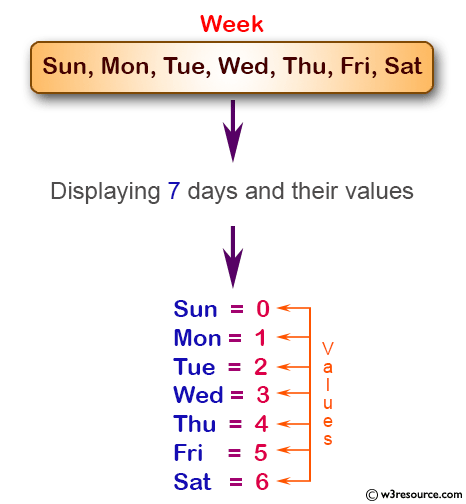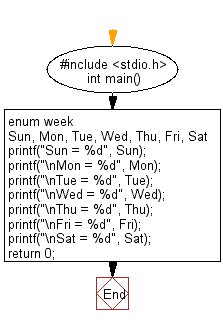C Exercises: Create enumerated data type for 7 days and display their values in integer constants
C Basic Declarations and Expressions: Exercise-60 with Solution
Write a C program to create enumerated data type for 7 days and display their values in integer constants.
Pictorial Presentation:

Sample Solution:
C Code:
#include <stdio.h>
int main()
{
enum week{Sun, Mon, Tue, Wed, Thu, Fri, Sat};
printf("Sun = %d", Sun);
printf("\nMon = %d", Mon);
printf("\nTue = %d", Tue);
printf("\nWed = %d", Wed);
printf("\nThu = %d", Thu);
printf("\nFri = %d", Fri);
printf("\nSat = %d", Sat);
return 0;
}
Sample Output:
Sun = 0 Mon = 1 Tue = 2 Wed = 3 Thu = 4 Fri = 5 Sat = 6
Flowchart:

C programming Code Editor:
Contribute your code and comments through Disqus.
Previous:Write a C program to display sum of series 1 + 1/2 + 1/3 + ………. + 1/n.
Next: Write a C program that accepts a real number x and prints out the corresponding value of sin(1/x) using 4-decimal places.
What is the difficulty level of this exercise?
Test your Programming skills with w3resource's quiz.
C Programming: Tips of the Day
Static variable inside of a function in C
The scope of variable is where the variable name can be seen. Here, x is visible only inside function foo().
The lifetime of a variable is the period over which it exists. If x were defined without the keyword static, the lifetime would be from the entry into foo() to the return from foo(); so it would be re-initialized to 5 on every call.
The keyword static acts to extend the lifetime of a variable to the lifetime of the programme; e.g. initialization occurs once and once only and then the variable retains its value - whatever it has come to be - over all future calls to foo().
Ref : https://bit.ly/3fOq7XP
- New Content published on w3resource:
- HTML-CSS Practical: Exercises, Practice, Solution
- Java Regular Expression: Exercises, Practice, Solution
- Scala Programming Exercises, Practice, Solution
- Python Itertools exercises
- Python Numpy exercises
- Python GeoPy Package exercises
- Python Pandas exercises
- Python nltk exercises
- Python BeautifulSoup exercises
- Form Template
- Composer - PHP Package Manager
- PHPUnit - PHP Testing
- Laravel - PHP Framework
- Angular - JavaScript Framework
- Vue - JavaScript Framework
- Jest - JavaScript Testing Framework
